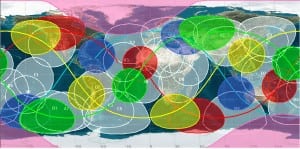Latest News
[Via Satellite 11-19-13] Between partnering with Inmarsat, releasing its positive third quarter earnings report and prepping for a brand new constellation, to call Orbcomm busy would be an understatement. Next week the company plans to ramp up its joint efforts with Inmarsat advertising modems that will allow both companies to reach a more global audience. In addition to this, the company is working toward launching 18 new satellites – built by Sierra Nevada Corporation and Argot ST – that will comprise the new Orbcomm Generation 2 constellation. Marc Eisenberg, Orbcomm’s CEO, spoke with Via Satellite to discuss how the company intends to approach its ambitious plans for 2014.
Next year, Orbcomm hopes to broaden its market share by making use of its new partnerships and technology. More specifically, the company wants to tap into larger areas like security and medical devices, according to Eisenberg. These markets require faster responses than the M2M specialist normally provides, but in 2014 Orbcomm expects itself to be capable of meeting those response times. “We think we can be really efficient in the use of bytes,” Eisenberg added, specifically for “limited use applications where the need is bytes or kilobytes as opposed to megabytes or gigabytes.”
Another way the company hopes to expand is by reaching markets that were not only cut off from satellite by natural barriers, but also regulatory barriers. “Orbcomm has got good technical coverage but we don’t have complete regulatory coverage. [If you] claim to cover the whole globe but you don’t have regulatory approval in China, what good is the technical coverage?,” Eisenberg said.
To more fully meet the definition of a global provider, Orbcomm plans to leverage its partnership with Inmarsat to reach larger swaths of the planet. “Greater than 80 percent of these modems have the same parts and the same footprint,” he said, referring to modems designed to run on the company’s OG2 VHF network and Inmarsat’s L-band network. This overlap means less trouble in getting approval. The companies are using similarity in product design to mean similarity in regulatory procedure. “If you look at the licenses that Orbcomm has and the licenses that Inmarsat brings, the product that we’re building together where you could just swap out the modem and they’ve got the same footprint, programing environment, billing, and, you know, this is your product for China and this is your product for Europe. It takes all of the development risk out of it,” said Eisenberg.
Further along, Orbcomm and Inmarsat plan to look for areas where they can collaborate on satellite design and manufacturing. “One of the thoughts behind the Inmarsat partnership is maybe there’s something we can do together,” said Eisenberg. “There’s nothing firm yet, but we’re certainly investigating a lot of opportunities.” All of the Generation 2 satellites remain scheduled to launch with Spacex. “They gave us a pretty good deal on buying rockets and Orbcomm made a commitment to them.” However Eisenberg did express interest in future international options if they were made available. “Some of the natural providers might be some of the Indian or Chinese rockets, but because of the ITAR restrictions we’re unable to launch on those today, but they might be opportunities in the future should those restrictions be relaxed,” he added.
All of these moves are purposed with bringing down costs so that Orbcomm can ultimately lower it’s prices. Its new technology will have backwards compatibility to keep it from losing old customers while still being competitive with newer options. “What has prevented satellite in the past is the hardware wanted to be really expensive, and the airtime wanted to be really expensive,” said Eisenberg. “What we are doing with these partnerships is we are leveraging each other’s scale. So we are going to take the whole satellite business and bring the hardware down to some compelling price points, to under $100, to start looking like terrestrial price points.”
Though no new customers have been recently announced, existing agreements with Doosan and Ryder both begin in 2014. With existing deals moving forward, Orbcomm seeks to broaden its global M2M opportunities through a combination of lower prices, better satellites and a truly global network. “There are a lot of advantages to satellite, and if we can put the price points in line, it’s going to be really compelling,” said Eisenberg.
Get the latest Via Satellite news!
Subscribe Now